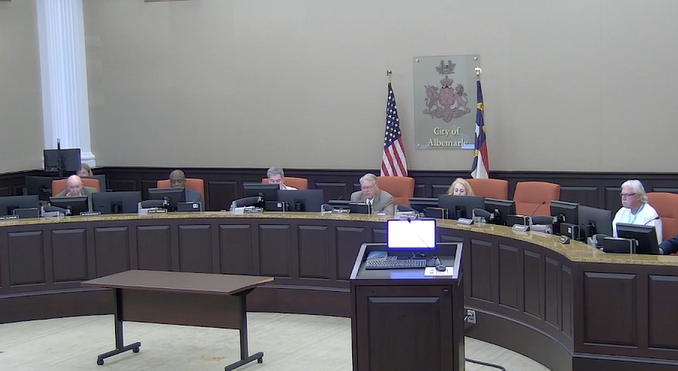
ALBEMARLE — At its regularly scheduled meeting on Sept. 18, the Albemarle City Council was presented with a Land Use Fiscal Analysis study from the urban planning and consulting firm Verdunity.
The study was requested by the council in order to examine the long-term fiscal health of the city, recommend potential long-term changes to Albemarle’s approach to land use and assist the city with its comprehensive plan and individual development decisions.
Using a video-conferencing virtual call and presentation, Verdunity founder and CEO Kevin Shepherd revealed an overview of the assessment’s findings in Albemarle — many of which appeared to be positive in nature.
“When we do the land use analysis, where we like to start is looking at your budget,” Shepherd said. “In your general fund revenue, something that I was excited to see with yours compared to some of the others we’ve done is that you guys have almost 50% of your general fund revenue coming from property taxes when you factor in your PILOT (Payment in Lieu of Taxes) revenue. That is a really, really strong position to be in.”
In a graph of the city’s general fund revenue budget of $19,584,410, property taxes make up 41% while sales taxes account for 28% and PILOT revenues come up to 7%. All sources were categorized in an “Other” group that made up 24% of the chart.
Shepherd noted that a few other cities that his company has recently modeled had property tax percentages in the 20-to-25% range, creating a situation that places a greater reliance on sales taxes, despite them being a more volatile revenue stream.
Verdunity recommends that cities should not rely on sales taxes to cover more than a third of basic services when aiming for a financially-strong position.
“When you develop something and put it in the ground, you want it to be generating enough in property tax to cover those service costs so that your sales taxes can go to quality-of-life things like parks and economic development,” Shepherd said. “From a fiscal health perspective here, a target that we encourage a lot of cities to work for is 50% for property taxes and you guys are pretty much there.”
While evaluating Albemarle’s undeveloped property, Shepherd included a friendly warning for the city to continue to be mindful of its growth strategies going forward.
“We see in a lot of cities where they punch infrastructure out to the area anticipating growth, but that growth hasn’t happened yet, so they’re a little bit behind the eight-ball on paying for that street the longer you go without having development on the ground…Not all growth and development is a good thing. Sometimes you might look at development coming in thinking it’s adding homes and a tax base, but it’s actually bringing on more liabilities that will make your long-term situation even harder.”
Noting that Albemarle has a mix of old growth to maintain and new growth coming in, Shepherd recommended that the city “scrutinize incoming development” to make sure that it will pay for itself as well as older developments.
Mayor Ronnie Michael thanked Verdunity and Shepherd for their work, adding that he was not expecting to hear density being encouraged as a developmental strategy.
“I was surprised to hear that you’re actually promoting density, even much more than we do,” Michael said. “We’ve had a lot of density here recently, but we continue to hear that we need a lot of open space. “Council, he (Shepherd) has given us something to study and discuss to prepare for the next budget year.”
The next city council meeting inside Albemarle City Hall Council Chambers is set for Oct. 2 at 6:30 p.m.
